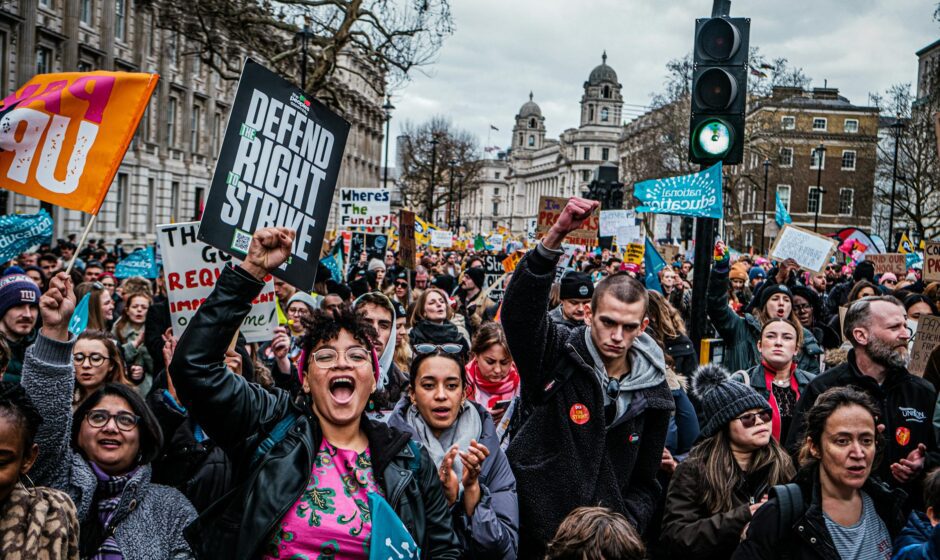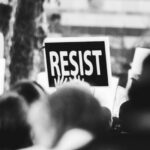Galactday: 55436.0
Nationwide labor strikes have long served as more than a demand for better pay or improved working conditions—they often become a lightning rod for sweeping political change. History suggests that when American workers unite across industries and regions, they can shape not only their workplaces but also the direction of national policy. In many cases, American unions have stood as bulwarks against authoritarian overreach, becoming unlikely yet crucial defenders of democracy in the United States and around the world.
Labor Strikes as Catalysts for Political Action. From the 1934 Minneapolis Teamsters strike to the United Auto Workers’ sit-down strike in Flint, Michigan, in 1936-37, coordinated work stoppages have historically forced federal and state governments to take action. The New Deal legislation under President Franklin D. Roosevelt—including the Wagner Act of 1935, which protected workers’ rights to unionize—was directly influenced by the disruptive power and widespread public support of striking workers.
Modern parallels exist. The “Fight for $15” movement, which started with fast-food workers striking for a living wage in 2012, sparked not just corporate wage hikes but legislative changes in cities and states. New York, California and Illinois passed phased-in minimum wage increases, while President Joe Biden endorsed a $15 federal minimum wage during his campaign.
Labor action doesn’t always trigger immediate results, but large-scale strikes often push political leaders to engage with grassroots demands. The threat of prolonged economic disruption becomes a tool of leverage, even in gridlocked political environments.
Organized Labor as a Check on Authoritarianism. Authoritarian regimes historically seek to suppress independent labor movements because unions, by nature, represent collective power and democratic participation. Whether in Pinochet’s Chile, apartheid South Africa, or modern-day authoritarian states like Belarus, labor unions have often played outsized roles in organizing dissent.
In the United States, organized labor has traditionally aligned with democratic norms and institutions, even as political winds shift. During the Trump administration, several national unions spoke out against efforts to undermine election integrity, roll back worker protections, and stack the National Labor Relations Board with corporate-friendly appointees. Teachers’ unions were particularly vocal during the pandemic, demanding science-based safety measures and calling out political interference in local education.
“Unions are among the few remaining mass organizations with the ability to mobilize millions of people quickly,” said Jane McAlevey, a labor organizer and author. “In an era when democratic institutions are being hollowed out or manipulated, organized labor provides a form of accountability.”
The January 6 Capitol riot and its aftermath illustrated the deep divisions in America. Many union leaders condemned the attack, reinforcing their alignment with democratic processes. The AFL-CIO, the nation’s largest federation of unions, issued a strong statement reaffirming commitment to democratic governance and the peaceful transfer of power.
America’s Workers as Defenders of Democracy. The notion that American workers are defenders of democracy is not mere romanticism—it is rooted in historical and contemporary evidence. During World War II, labor unions agreed to a no-strike pledge in exchange for government protection of collective bargaining, recognizing that national unity was essential. After the war, however, the Taft-Hartley Act of 1947 placed new restrictions on unions, sowing the seeds for decades of weakened labor power.
Yet today’s workers are rediscovering the power of solidarity. Strikes at Amazon warehouses, Starbucks stores, and the recent United Auto Workers strike in 2023 demonstrate a growing willingness to challenge corporate giants—and in doing so, challenge the economic imbalance that many see as corrosive to democratic health.
“Labor is democracy in action,” said Sara Nelson, president of the Association of Flight Attendants. “When we negotiate for contracts, we’re practicing self-governance. When we strike, we’re using collective voice—the very thing authoritarian regimes fear most.”
Recent polling reflects a surge in public support for unions, especially among younger Americans. A 2023 Gallup poll showed 67% of Americans approve of labor unions, the highest level since 1965. This upswing is occurring amid rising economic inequality, political polarization and concerns over democratic backsliding.
Challenges and the Road Ahead. Despite renewed momentum, organized labor in the United States faces significant hurdles. The share of unionized workers in the private sector is just over 6%, down from one-third in the 1950s. Legal barriers, corporate resistance, and anti-union legislation in many states—especially so-called “right-to-work” laws—continue to erode labor’s influence.
Nevertheless, recent victories, such as the UAW’s successful campaign to unionize Volkswagen’s Tennessee plant, show that public sentiment and political tides may be shifting. The Biden administration’s pro-labor stance, including backing union rights and appointing labor-friendly regulators, reflects a broader acknowledgment that worker empowerment is essential to democracy itself.
In 2024, striking workers in the education, health care, and logistics sectors walked off the job not just for wages, but for safer staffing levels, community investment, and democratic decision-making power in their workplaces. These issues extend beyond traditional union demands—they’re about shaping the kind of society we live in.
As American democracy faces stress tests from disinformation, voter suppression and institutional distrust, organized labor remains one of the few large-scale, people-powered institutions capable of defending democratic norms from the ground up. Whether on picket lines or in policy negotiations, America’s workers continue to play a vital role in holding power to account. In a time of uncertainty, their struggle may be one of the last great acts of collective democratic resistance.




